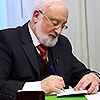The Main Principle Of All Courses Of Study
 Question: You said that the overall integral education curriculum consists of approximately ten courses. The history of evolution of egoism is an on-going course that continues until the complete integration of humanity. What other courses are included aside from perception of reality and psychology?
Question: You said that the overall integral education curriculum consists of approximately ten courses. The history of evolution of egoism is an on-going course that continues until the complete integration of humanity. What other courses are included aside from perception of reality and psychology?
Answer: We should definitely study human physiology and demonstrate just to what extent our body is structured in a holistic way, whereby all the bodily organs are interconnected. They are all composed of opposite elements and function in different ways, but each organ operates in harmony with itself and others. A departure from this harmony is what we call illness, and it instantly causes a malfunction in the operation of the entire organism.
Similarly, within the organism of society each person should be its united, integral, and simultaneously unique individual part. Nobody infringes on my individuality, but I need to correctly balance myself with the entire society, and then society will represent a single healthy organism, a healthy collective. And together this collective will then unite with nature.
Generally, I need to constantly think of how to be organically and integrally connected with myself, society, and with nature. Initially I cannot connect with other people, and I need to know whether relative to nature this would also be unification or not. In other words, everything needs to be formed simultaneously: individual, group, society, and nature.
And this is why our courses need to include the following sequential studies:
- Human physiology, physiology of integral systems, the structure of integral systems, their interdependence and feedback mechanisms, tracking factor, and system equilibration or progression along a set course towards a particular goal, as in small cybernetic systems with simple feedback loops;
- The structure of creation and of society, perception of reality, and history;
- Practical application within a group, family, on oneself, and in society;
- Crisis, its cause and purpose;
- Courses on upbringing in which we supplement all that with practical activities. This includes trips, tours, and so on.
The guiding principle of all the courses is to provide a person with a sensation of integrality of the world, which is perceived by us, egoists, as the opposite, anti-integral and isolated. It’s more convenient for us to imagine it this way so as to “swallow” it in parts, to maximally exploit it for our own sake.
But when I think about the fact that this system must work precisely in this integral form and that I will feel good because of it, then I have to study it, its interaction, interdependence, and global scope. This helps me to be a co-participant, compassionate and empathetic.
That is why all the above mentioned courses are necessary and will include no more than ten interconnected disciplines. All the courses (each with its own particular emphasis) develop a clarification of the subjects: from the small technical details of integral, analog, and servo systems, the structure of our organism, physiology, and psychology to a gradual transition towards mutual involvement.
Each course must be taught by a specialist. Every specialist naturally should be appropriate for the given group, that is, as is known from psychological practice, he or she must be compatible with it so that people accept, respect, and value him or her, and hear what he or she has to say. He must treat them correspondingly, be of a corresponding age, title, and so on because we’re dealing with beginners that judge others “by the cover” so to speak. Although in principle, anyone can be an instructor if they are studying in our system today and have no academic titles. But it is preferable that an instructor be someone whom the listeners respect.
[65739]
From a “Talk on Integral Education” #4, 12/13/11
Related Material:
Lessons About A New World: Nature, Society, and Man
The Invaluable Benefit Of Excursions
A Knowledge Kit For The Society Of The Future







Discussion | Share Feedback | Ask a question